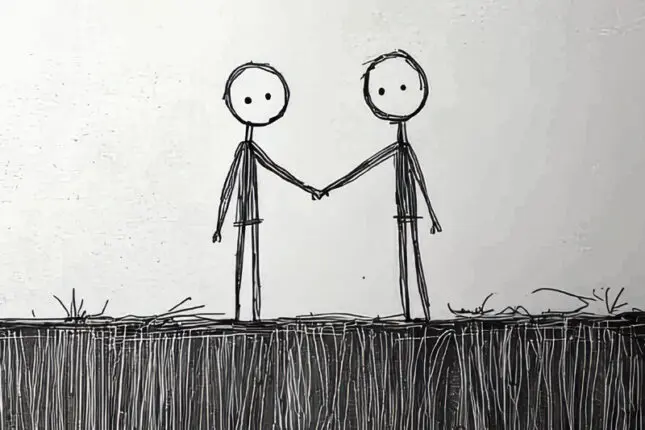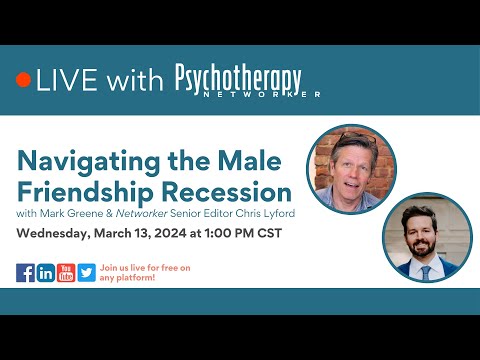Enjoy the audio version of this article—perfect for listening on the go.
Perhaps no breakup has hurt more than the one I had with my closest friend from college. Almost two decades later, I still feel a dull ache when she comes to mind, like a bone that fractured and never properly reset. When my patients ruminate on similar stories—from life-long friends who slowly backed away from connection, to acute, sudden moments of betrayal that leave a friendship shattered—I’m not surprised when their wounds, like mine, fester. The majority of the time, no conversation was had, boundaries were left undefined, and the breakup was not formalized, all of which leaves the bereaved drowning in a sea of ambiguous loss and complicated grief.
It’s at this point that I find myself reminding my patients that friendships are indeed relationships too. Just like romantic ones, they require maintenance, have conflict, and much to our chagrin, are not always meant to last forever. I also remind them that a good friendship, like a good marriage, is profoundly intimate. Close friends have the capacity to be our mirrors, reflecting truth seen more clearly through their eyes than our own. We can share our full selves with them and in turn, we feel existentially less alone in this at times brutal world. They are our anam cara, our “soul friends,” a Celtic term popularized by Irish poet John O’Donohue to describe the rare connections in our life characterized by trust, authenticity, and spiritual depth. An anam cara can even feel transcendent. In teaching us about surrender, love, and the full acceptance of another, soul friends are considered a path to the divine.
Writer and civil rights activist James Baldwin says, “The role of the artist is exactly the same as the role of the lover. If I love you, I have to make you conscious of the things you don’t see.” While I’m certainly not in the habit of editing Baldwin, I think he could replace lover with soul friend. In my own case, it’s been a soul friend of 25 years—not a lover—who has pointed out more blind spots to me than I can count. It’s hard to imagine the trajectory of my emotional and spiritual growth without her.
That said, as in romance, with this depth and intensity of connection inevitably comes shadow. If a relationship can bring tremendous light, there’s also the potential that it will bring an equal and opposite degree of darkness. The soul is whole, encompassing all. Thus, the soul friendship encompasses all, too. This is the unavoidable other side of the soul-friend coin. There will be times of closeness and times of distance. There will be conflict, even if it is pushed underground. There will be transference, projection, anger, compromise, sacrifice, and times needs are not met.
No one is surprised when this happens with a lover. We know that challenges in romantic relationships are inevitable and that it’s best not to avoid conflict but rather learn to engage in it well. We’ve seen the popularization and destigmatization of couples therapy in the last decade. However, in both my experience and that of many of my colleagues, the stigma around discord in friendship as well as friendship therapy remains alive and well.
This is partly because we’ve whitewashed friendships, expecting volatility to exist solely in the romantic arena, relegating friends to the far narrower role of support and unconditional love. Then, when issues arise, we’re left unprepared and defenseless. Here we see a dangerous, false and faulty division. Romantic love is allowed to hold conflict, platonic love is expected to maintain an unrealistic neutrality that may threaten the very friendship itself.
In our culture, one in which we have finally accepted that relationships take work, we can no longer afford to expect friendships to be easy.
Bumping Up Friendship in the Relationship Hierarchy
We need strong friendships now more than ever. Though modern society has typically emphasized the importance of romantic love over friendship, fewer people are getting married these days and are often relying on friends as their primary attachments. Unconventional living arrangements are more typical with people hungry to exist in larger community as opposed to within traditional, familial households.
These seismic shifts were already underway, then came a global pandemic, a loneliness epidemic, our isolating addiction to smart phones, the advent of AI companions, and frightening geo-political turmoil. With existential fears at an all-time high, we long for the safety inherent in a network of strong attachments. We long for our tribe. As such, friendship needs to be reprioritized, to be bumped up in the hierarchy of relationships, not as second to romantic love, but as equally important, an integral element of a balanced and meaningful life. Where we’ve been conditioned in today’s culture to believe one person is enough, we’re now waking up and remembering that we have and always will need many.
To shift friendship to its rightful place of importance in our lives, the conventional friendship script needs a dramatic rewrite.
First, when we hit a challenge with a friend, instead of coping with avoidance, we must courageously but gently move toward them, remembering that we can learn just as much from the hard times as we can from the good. We need to begin to utilize simple phrases common among couples yet somehow still so taboo in friendship, like “That really hurt,” or “I’m angry.” We need to reflect on our pain, take responsibility for what is ours, and remember that transference—feeling as if someone is abandoning you like your mother or being critical of you like your father, for example—is not solely active with our spouse or therapist.
The past needs to be sussed apart from the present in friendship too. At the very least in platonic relationships, we must normalize the natural rupture and repair cycle—the process of well-handled disconnection giving way to deeper connection and safety. If we don’t, painful unexpressed feelings are apt to bleed elsewhere, becoming toxic gossip or emotional cut-off.
Letting Go
We’d also do well to normalize friendship breakups. It’s shocking that with 50 percent of marriages ending in divorce, requiring an unknotting of the infrastructure of people’s entire lives, divorce still feels more commonplace and palatable than a friend breakup. Patients often report to me that they feel stuck in friendships “forever,” not knowing how to get out. They tell me that a friendship feels stale, that it’s become “one-sided,” that they’ve grown in a different direction, that tension has been high for years because so much has been left unsaid, swept under a now lumpy rug.
We must accept that like most of our romantic partners, some friends may have been right in particular chapters but are not meant to be in the whole story. Can we give ourselves permission to redefine friendships, to take space when needed, and if the situation calls for it, to let go? Can we tolerate and accept—as hard as it may be—when a friend feels it’s time to let go of us? This was perhaps the most difficult part of my breakup with my friend from college. I had to eventually come to terms with the fact that despite my best efforts to reconnect, she was simply ready to move on.
Holding Close
With the friends who are indeed for life, who you fight with and thus fight for, can we begin to show them more appreciation? Instead of unconsciously believing our friends will and should just always be there for us, can we nourish our friendships, like we do our romantic partnerships? Let’s take more trips with friends, not just with spouses. Let’s buy them gifts when we see something that would brighten their day. Let’s say “I’m grateful for you,” and “You look beautiful” and “You were right, I’m sorry.” This is always important, but perhaps even more so for our friends who are single, and who may not consistently get this type of intimacy and connection elsewhere.
Lastly, we have to let our friendships evolve. Great friendships are vibrant and dynamic, which is why we cherish them, but that means they also exist in a state of flux. They’re always moving and always changing. We can’t freeze them in some preferred state—a fool’s errand that robs them of their humanity—just because it makes us feel more secure. We must let them dance.
It’s often said by couples therapists that we have three marriages, if we’re lucky they are to the same person. This concept can be applied to our closest friendships too—that is, if we’re brave enough to let it.
Jordana Jacobs
Jordana Jacobs, PhD, is a New York City-based clinical psychologist in private practice, speaker, and writer. Her work at Memorial Sloan Kettering, as well as her Vipassana meditation practice and studies in Northern India, inspired her research on the relationship between death awareness and love. You can learn more about her at: drjordanajacobs.com.













